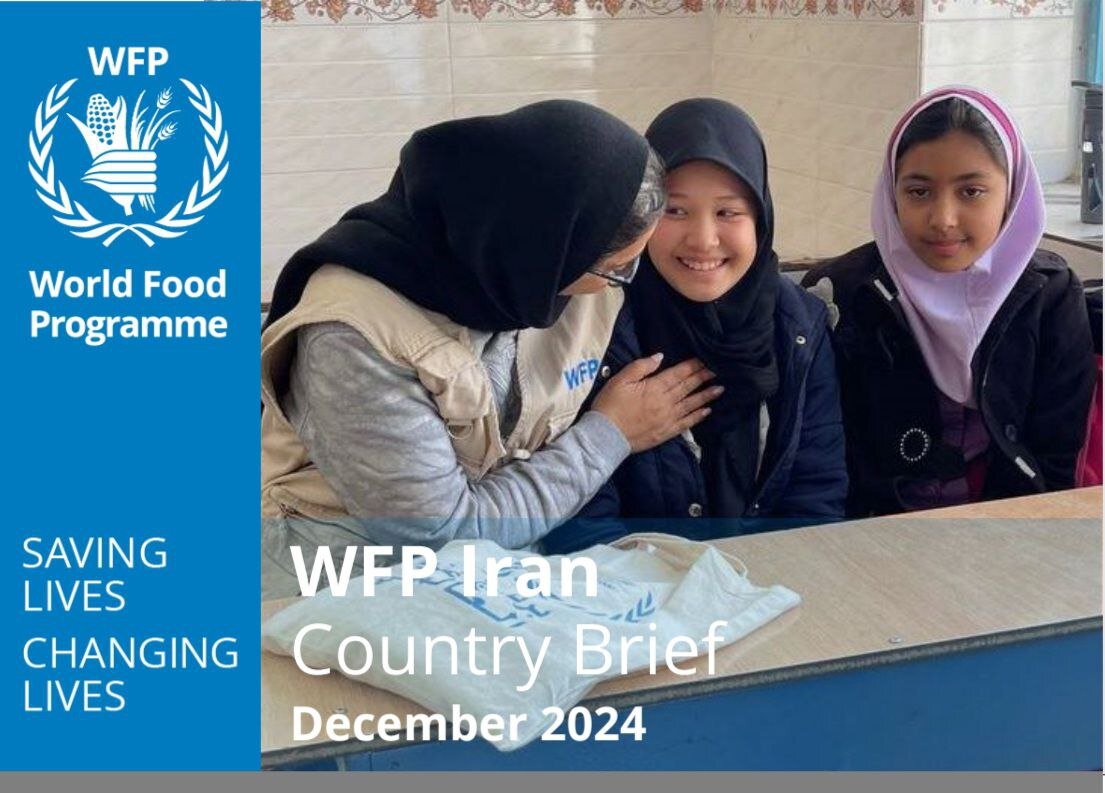WFP releases December report on Iran

TEHRAN –The World Food Program (WFP) has released a report, expounding on activities in Iran over December 2024.
In December, WFP food assistance reached 33,215 beneficiaries, which included Afghan and Iraqi refugees as well as Iranian teachers. Refugees are assisted with a staple food basket which includes fortified wheat flour (12 kg per person per month) and vegetable oil (810 ml per person per month).
In addition to this in-kind food assistance, WFP provides cash assistance to 7,370 Afghan and Iraqi refugee households each month. In December, households headed by refugee men received Iranian rials (IRR) of 2.5 million (US$ 4.6, according to the UN Operational Rate) per person.
Households headed by refugee women received a slightly higher monthly cash allocation, amounting to IRR 3 million (US$ 5.5) per person due to limited access to working opportunities, leading to higher food insecurity.
Due to the approaching winter lean season, under authorization by the Centre for Aliens and Foreign Immigrants’ Affairs (CAFIA), of the Ministry of Interior, WFP doubled its cash assistance to all beneficiaries in settlements for December 2024. This extra allocation aimed to safeguard food security during the lean agriculture season and enhance the purchasing power of refugees, given restricted income opportunities.
The winterization top-up, equivalent to the standard cash entitlement for December, was provided to both male-headed and female-headed households.
In December, 9,252 refugee school children including their teachers received daily school snacks consisting of milk, date bars and/or fortified biscuits.
By December 2024, WFP Iran helped ease the financial burden associated with the gluten-free dietary needs of 52 refugee celiac patients from WFP’s beneficiaries by providing them with an extra cash amount of 7.7 million rials (US$ 14.27) per person as a replacement for their usual food entitlement.
To support the income generation and resilience of 312 refugees (51 percent women and 49 percent men), in December, WFP continued supporting the operations of 20 livelihood activities across 17 settlements, including welding, tailoring, baking, and farming.
Following WFP’s Disability Inclusion Workplan 2023, WFP implemented a pilot initiative in two settlements, Shahid Naseri of Markazi and Mohajerin of Semnan provinces, providing refugees with disabilities a monthly cash top-up of IRR 1.5 million (US$ 2.7) across nine settlements, on top of their regular entitlement.
In December, WFP scaled up its response by assisting an additional 10 refugee since November, reaching a total of 271 persons. This follows the program expansion in October, covering Kerman, Lorestan, West Azarbaijan, Fars, Khuzestan, Markazi, and Semnan provinces.
WFP Iran’s Budget Revision of the Interim Country Strategic Plan (ICSP) was approved in September, leading to adjustments in the Needs Based Plan (NBP). Due to evolving circumstances including the suspension of two planned new refugee settlements to accommodate displaced persons from Afghanistan, the revision made changes as follows.
** Reduced the total planned number of beneficiaries from 52,000 to 35,000.
** Extended the duration of ICSP by two years, now covering April 2023 to December 2027, aligning with the United Nations Sustainable Development Cooperation Framework (SDCF) duration.
The total ICSP budget has increased by USD 5.8 million, bringing it to USD 42.82 million, to account for these adjustments and the plan’s extended timeline.
WFP determined to support Iran in hosting refugees
Maysaa Alghribawy, the new representative of the World Food Program (WFP) in Iran, has announced the organization’s commitment to supporting Iran as one the biggest refugee hosting countries.
Highlighting the challenges faced by the WFP in the region, Alghribawy asked for enhancing cooperation and interactions with the country to advance the organization’s efforts and responsibilities in Iran, as well as the region, foreign ministry website reported.
The official made the remarks on Sunday, January 12, in a meeting with Iranian Foreign Minister Abbas Araghchi, while presenting her credentials, and giving an account of this humanitarian organization’s programs and operations in food security.
Araghchi, for his part, underscored the significance of promoting collaborations saying that “addressing humanitarian crisis, including refugees and migrants’ crisis, in West Asia requires regional and international cooperation.”
MT/MG
